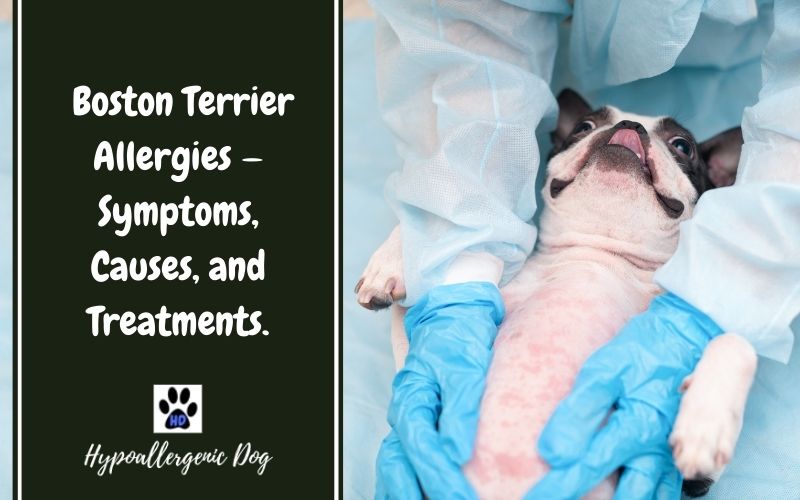Does My Boston Terrier Have Allergies?
If your Boston terrier hasn’t been themselves recently, have you considered allergies could be to blame? Due to their genetic makeup, they’re a super sensitive breed.
Three main types of Boston terrier allergies are predominantly reported by owners. However, the symptoms of these can overlap and even happen simultaneously, which can make it increasingly difficult to diagnose the root cause of your pup’s discomfort.
Identifying the key triggers of your bow-wow’s allergies and limiting exposure as much as possible is the most obvious and effective way. Yet, at times it may feel like an uphill challenge.
Boston Terrier Allergy Symptoms
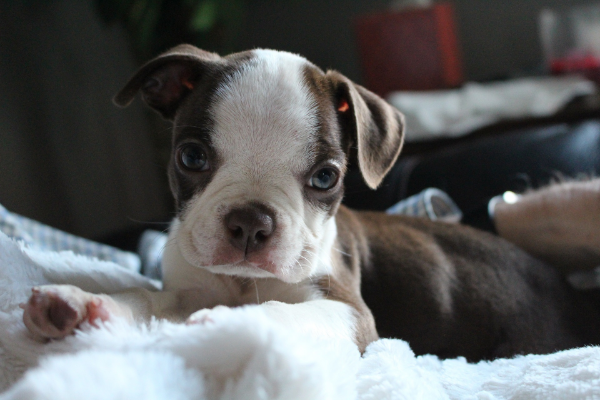
Regardless of the allergen affecting your pooch, Boston terriers and allergies often have several commonly spotted symptoms. The difficulty in diagnosing the origin of your pup’s issues lies in the overlapping of these symptoms, which include:
- Patches of red/inflamed skin.
- Ear or skin infections.
- Recurring stomach problems.
- General unhappy behavior.
- Hair loss.
Another reason that Boston terriers are more prone to allergies is their genes. If both the parents of your pup suffer from allergies, it can make them up to 60 percent more likely to develop allergies themselves!
Reputable breeders will be able to tell you of any allergies or other possible issues that could be passed on to their puppies. However, make sure you ask the right questions if you’re considering this breed as your loyal companion.
Boston Terrier Food Allergies
As Bostons are susceptible to allergies you may want to rethink their diet — to make sure you’re providing the best nutrients possible.
It’s reported that 10 percent of all allergy cases in dogs are food-related, which can develop at any stage and come on quite suddenly, often surprising pet parents.
If your furry friend is suffering from an allergy to food. It will lead to more issues with their digestive system and gut health, which can manifest as:
- Sickness.
- Gas.
- Bad breath.
- Diarrhea.
- Loss of appetite.
Many vets suggest an elimination diet — feeding your pooch a new menu of simple ingredients and one source of animal protein for a minimum of eight weeks. This enables you to slowly reintroduce possible allergens to identify the offender.
Fortifying your dog’s diet with vitamins E and B as well as omega-3 and 6 fatty acids can help to reduce itching and improve their coat.
If your furry friend has a sensitive disposition, why not check out our guide to The Best Hypoallergenic Dog Treats.
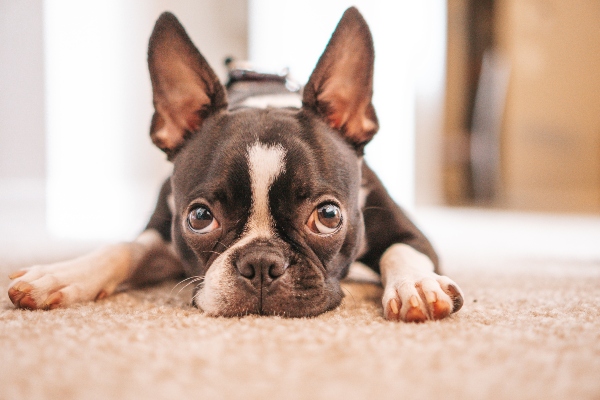
Boston Terrier Skin Allergies
Allergies often first affect your dog’s skin, which will become red and flaky. This inflammation can spread to their ears, legs, and belly — leading to great discomfort. It’s also why you may spot your Boston terrier’s allergies turning into hot spots and secondary skin infections — from excessive itching, chewing, and licking of the soreness.
The most highly reported issue with Boston terriers and allergies is how prone this breed is to skin allergies. Allergic dermatitis is the medical name given to irritation of the skin as a result of allergies.
Boston terrier’s allergies are a knock-on effect of their hypersensitive immune systems, which can be triggered by a large variety of sources. For example, cleaning products and perfumes as well as grass, pollen, and household molds.
The most common symptoms of Boston terrier skin allergies are:
- Itching.
- Redness.
- Hotspots.
- Dry, flaky skin.
- Unusual odor.
Treatment, like medicated shampoos, can provide immediate relief, when used correctly. They’re designed to reduce inflammation. That said, you should always make sure you’re addressing the root cause of the problem — eliminating exposure to the allergen. And, preventing any broken skin from getting infected.
Shampoo ingredients such as aloe vera, oatmeal, and honey will benefit your pooch. Conventional medicines like a topical antibiotic spray, ointment, and antihistamines are all other treatments to try. However, you may need to speak to your vet about these.
For an in-depth guide, take a read of our dog shampoos for allergies roundup.
Do Boston Terriers Shed a Lot?
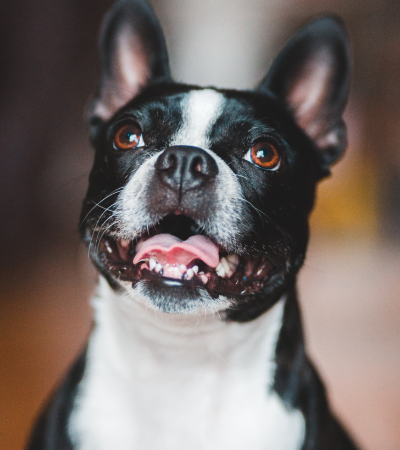
Shedding is a natural process your dog uses to eliminate dead hair. Yet, if you suffer from allergies, you may be looking at how to stop a Boston terrier from shedding.
Fortunately, Bostons have a single coat of thin fur, meaning they don’t have seasonal shedding blowouts, and their dense, short hair won’t shed too drastically throughout the year.
That said, they are prone to shedding excessively when under high stress from separation anxiety and other emotional behaviors. If you need ideas on how to overcome this issue, why not take a look at our guide to Calming Dog Beds.
What’s more, when a Boston terrier’s allergies are playing up this can also increase shedding. As they excessively itch and scratch at their skin, it leads to irritation and further scratching.
So, to answer the question, do Boston terriers shed?
Usually, the breed has very limited shedding making them an allergy-friendly pooch. However, they do suffer from allergies, which can result in itchy and inflamed skin. Subsequently, this can influence the amount your terrier will shed.
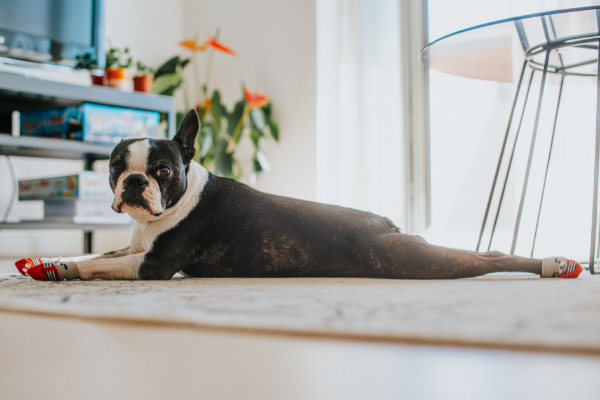
Conclusion
Boston terrier allergies are a frequently reported problem, with a high percentage of the breed developing allergies to several triggers — so you’re not alone.
Whether your dog suffers from skin, food, or environmental allergies — or all three —, as their human, it’s down to you to help them. Special shampoos can alleviate skin complaints, changing their diet can both reinforce their health and eliminate the allergen. Plus, medication like antihistamines will reduce the reaction.
In short, Boston terriers’ allergies shouldn’t take away the fact that this breed is a well-mannered, loving, and wonderful woof woof to have in your home.
Boston Terrier Allergies FAQs
What Is the Best Food for a Boston Terrier With Allergies?
Dog foods that contain only single sources of vegetable protein, animal protein, and carbohydrates are the ideal foods for any pet who suffers from allergies.
If you want to know more, read our guide on the Best Hypoallergenic Dog Foods.
Why Do Boston Terriers Stink?
If your Boston terrier has an odor, this can be a related symptom of allergies such as skin issues, ear infections, or a build-up of dead, dry skin.
How Do I Stop My Boston Terrier From Itching?
Doggy-friendly shampoos are an ideal way to alleviate irritation and soothe the skin. We’ve put together some of our favorites in our Dog Shampoo for Allergies guide.
Are Boston Bulldogs Hypoallergenic?
No. Yet, they are considered a low-drooling and shedding breed. If you would like to know which dogs are hypoallergenic — head on over to our small, medium, or large breed lists for more information.

